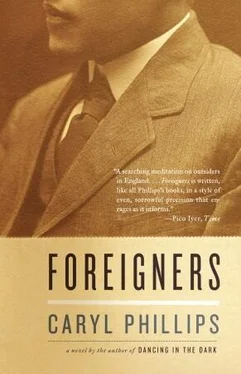Dr Johnson's only hope, as he understood it, was to attempt to avoid too much in the way of either seclusion or idleness, and so he was often discovered by his negro watering his tiny garden, or sitting at the stout mahogany table that decorated the drawing room and busily translating an obscure literary work, or writing long letters. However, even this pleasure was sometimes denied to him, for occasional inflammations of the good eye often made it impossible for him to read for days on end. At these moments, Francis' presence served to provide him with the opportunity of a few hours of much-needed conversation. And then, early one fateful morning, Francis arrived from his home on St John Street, Smithfield, and discovered his master sitting upright in his chair, which was not unusual for the doctor's bronchial asthma was so severe that he was generally afraid to lie flat at night. However, what made this occasion disturbing was the fact that when the loyal Francis entered, talking away as usual, there was no reply from his master. It was then that Francis noticed a handwritten note, and by this means he discovered that during the dead of night his master had become overwhelmed by confusion and giddiness, suffered a stroke, and subsequently lost the power of speech. Francis immediately summoned Dr Brocklesby, his master's physician and best friend, and over the course of the following two to three days, and after much dosing and blistering, Dr Johnson's speech eventually began to return to him.
During this period, Dr Brocklesby spoke privately with Francis and shared with the servant his worry that, aside from the doctor's various physical afflictions, his master was suffering greatly from an oppressive loneliness that would only be resolved by his actively seeking the company of others. Conversing carefully with the occasional visitor over dishes of tea, or keeping the peace among his squabbling household servants, was never going to be enough to satisfy the intellect, or truly arrest the isolation, of the great man, whose appearance had, even by his own negligent standards, become wretched. These days the neck of his shirt and his breeches were habitually loose, his stockings were in need of being drawn up, he wore his shoes unbuckled, and his unpowdered wig was comically small and precariously balanced on his oversized head. There were very few 'clean shirt' days. Dr Brocklesby was sure that only by forcing the doctor back into society might things improve and so, during the harsh winter of 1783, his friends, myself among them, advanced the idea of establishing a small club in Essex Street, as a place where the doctor might enjoy congenial company and good conversation.
We members of this new association were encouraged to dine three times a week and suffer a fine of three pence should we miss a gathering. The first meeting was held at the Essex Head Tavern and it attracted an enthusiastic crowd, but Dr Johnson was racked with asthma, and clearly struggling to breathe properly, so much so that he was too ill to return home unaided. However, the true drama of the occasion was the doctor's behaviour during the gathering. For some time now his friends had noticed that his severe humour and dogmatic manner seemed to intensify as his ailments took a firmer grip. At such moments he would become increasingly oppressive in conversation which caused many, including those who held him in the highest esteem, to grow first to fear, then to abhor, his unpolished and disagreeable irascibility. The doctor's favourite technique of argument was usually a flat denial of his opponent's statement, irrespective of how foolish this made him appear, followed by a grand assault of verbal brilliance such as one might expect from a man who had fixed the English language and succeeded in ridding it of cant. But sadly, these days those opponents whom he could not vanquish by force of his admittedly large intellect, he simply bullied into submission with a vile display of rudeness which seemed unrelated to any quantities of drink that he might have consumed. Thereafter, he often failed to make amends by raising a glass to the offended person's health or shaking his hand when he left the room, gestures which he had long been accustomed to offering.
After the first meeting of the new association, it was nearly two months before the doctor was well enough to once again venture out of his house. During this period, Francis and his wife Betsy and the children moved their household into Bolt Court. This caused the doctor's friend, Sir John Hawkins, some consternation, but he temporarily set aside his prejudices and simply urged the great man to put his affairs in order and immediately prepare a will. However, Dr Johnson was fearful that such a course of action might suggest a willingness to cease struggling with life, and as such he baulked at taking a step that, in his rational mind, he knew to be both sensible and natural. The very thought of his own dissolution and eventual death was intolerable to him, but the one issue that he admitted must be swiftly resolved was the matter of what would happen to Francis, who had served him faithfully for almost thirty-five years, and about whose future he agonised. The doctor had little confidence in Francis' powers of survival, for he understood his servant's weaknesses and he had laboured hard to both accommodate these faults and at the same time protect the man. One afternoon the doctor asked his friend and physician, Dr Brocklesby, what might be a proper annuity to bequeath a highly regarded servant, and he was told that fifty pounds a year might be considered a generous amount. Dr Johnson listened carefully, and then decided upon seventy pounds a year for Francis, whom he determined would be his principal legatee. He instructed Sir John Hawkins to draw up the draft of the will and to include the generous legacy to Francis, however, Sir John Hawkins left blanks where, in good time, he imagined Dr Johnson would insert the names of other legatees, but the doctor appeared to have no desire to do such a thing. Instead he named two more executors, Sir Joshua Reynolds and Dr William Scott, and charged them and Sir John Hawkins with the task of disbursing sums to a few others after his death, and then he reiterated his desire to give 'the rest of the aforesaid sums of money and property, together with my books, plate, and household furniture. . to the use of Francis Barber, my manservant, a negro. .'
Sadly, Dr Johnson's recurrent battles with asthma continued to prevent him from attending the Essex Street Club as regularly as he wished. In fact, as he became increasingly aware of the reality of his situation, Dr Johnson decided to travel to Lichfield and revisit his youth, but while there his ailments caused him to sleep long and often, and his suffering seemed only to increase. And then the doctor received news of the death of Miss Williams, who had, for some time, been languishing in helpless misery, and this loss left him desolate. He returned to London where he yearned for pleasant company and conversation, but most of his time was spent in a deep, but agitated, slumber that was inevitably punctuated by raucous breathing and the occasional yelp of pain. Francis continued to attend upon him daily, but as his master's condition worsened the negro made sure that he was also available for long nightly vigils in the sickroom in case the doctor's pain became intolerable. On the morning of Monday 13 December, Francis noted that the slumbering doctor's breathing had become difficult, and then his master awoke suddenly with a series of convulsive movements that alarmed Francis. Apparently the pain in his master's legs was so unbearable that the doctor snatched up a pair of scissors and plunged them deep into his calves causing jagged wounds. This afforded the doctor some relief, but also occasioned a loss of blood which startled Francis and Mrs Desmoulins, who had recently arrived at the house to offer what help she could. In fact, she had another reason for attending upon her beloved Dr Johnson on this day, for she wished to receive his blessings, which he was happy to give. Once the bleeding had stopped, the doctor slowly turned to Mrs Desmoulins and whispered, 'God bless you,' in a trembling voice. Francis waited and watched as Mrs Desmoulins fought bravely to hold back her tears, and then she rushed quickly from the room.
Читать дальше











![Unknown - [Carly Phillips] The Bachelor (The Chandler Brothe(Bookos.org) (1)](/books/174132/unknown-carly-phillips-the-bachelor-the-chandle-thumb.webp)
